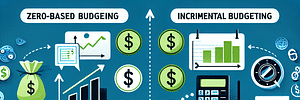- Understanding your recurring expenses is like having a roadmap for your financial journey.
- Identifying recurring expenses helps you spot unnecessary spending and boost your savings.
- Review your recurring expenses at the end of the year, during income changes, lifestyle changes, and unexpected expenses.
- Use budgeting tools and apps to easily track and manage your recurring expenses.
- Reduce your recurring expenses by cutting unnecessary subscriptions, negotiating better deals, and taking advantage of deals and coupons from GreatBuyz.
Dive into the World of Budgeting: Your First Step Towards Financial Freedom 🚀
Welcome to the world of budgeting, a crucial stepping stone on your path to financial freedom! Ever wondered how some people seem to have their finances under control, while others constantly struggle? The secret lies in understanding the budgeting process, and more specifically, in recognizing the role of recurring expenses in your budget.
What are recurring expenses, you ask? They are predictable, regular costs that you have to pay every week, month, or year. Think about your rent or mortgage, utility bills, subscriptions, groceries, transportation, and gas. These are all recurring expenses that form a significant part of your budget.
Understanding your recurring expenses is like having a roadmap for your financial journey. It helps you anticipate your spending, plan for savings, and avoid financial pitfalls. The key is not just to track them but to review and adjust them regularly. This is where our 'budgeting process explained' guide comes into play.
Want to know how to look at recurring expenses and make them work for your budget? Curious about tips for saving money on day to day expenses, or how to save money on groceries and transportation? Stick with us, and we'll unravel the secrets of successful budgeting together!
And remember, budgeting doesn't mean you have to give up on shopping or enjoying life's little pleasures. With GreatBuyz, you can find the best deals and coupons to save on your recurring expenses. Imagine enjoying a shopping spree without breaking the bank! Ready to dive in? Let's get started!

Spot the Repeat Offenders: Why Identifying Recurring Expenses is a Game Changer 💡
Understanding the importance of identifying recurring expenses is a game-changer in the financial planning process. Why, you ask? Because it's like having a crystal ball that helps you predict your future spending and savings. Just imagine being able to foresee your financial future and plan accordingly!
Recurring expenses are those pesky repeat offenders in your budget, such as groceries, transportation, utilities, and gas. They show up month after month, often consuming a large chunk of your income. But here's the silver lining: since they're predictable, you can plan for them and even find ways to reduce them.
Let's say you've been spending a significant amount on groceries every month. By identifying this as a recurring expense, you can use tips to save money on groceries to cut down your costs. Maybe you can start shopping at a cheaper store, use coupons, or buy in bulk. The same strategy can be applied to other recurring expenses. For instance, you can save money on transportation by carpooling, or save money on utilities by being more energy-efficient.
Identifying recurring expenses also helps you spot any unnecessary spending. Are you paying for a gym membership you never use? Or a streaming service you rarely watch? These are the perfect examples of recurring expenses that can be eliminated to boost your savings.
So, by keeping a close eye on your recurring expenses, you can take control of your financial future. You can predict your spending, plan your savings, and enjoy a shopping spree without breaking the bank. Now, with the help of incremental budgeting, isn't that a win-win situation?
Average Allocation of Recurring Expenses
Timing is Everything: The Best Moments to Review Your Recurring Expenses ⏰
So, when is the ideal time to review your recurring expenses? The answer is - there's no one-size-fits-all approach, but there are certain scenarios that make it a must. One such scenario is the year-end review. As you bid adieu to the old year and welcome the new, it's a great time to reflect on your spending habits. Did you overspend on utilities or did you manage to save money on groceries with savvy shopping tips? This is the time to evaluate and plan for the year ahead.
Another crucial time to reassess your budget is when there are changes in your income. Got a raise? Congratulations! But before you splurge on that designer bag, consider how you can allocate this extra income towards your savings or investments. On the flip side, a decrease in income means you'll need to tighten your budget. This might involve finding ways to save money on transportation or cutting down on non-essential subscriptions.
Changes in lifestyle, such as moving to a new city or starting a family, also warrant a review of your recurring expenses. Your cost of living might increase or decrease, and your budget needs to reflect that. Lastly, unexpected expenses like medical bills or car repairs can throw your budget off balance. When life throws you a curveball, it's time to revisit your budget and make necessary adjustments. For these unexpected expenses, you can refer to our guide on budgeting for life's unexpected events.
Remember, the key to effective budgeting is regular review and adjustment. So, are you ready to take control of your recurring expenses and maximize your savings?
Understanding When to Review Your Recurring Expenses
Test your understanding of when to review your recurring expenses with this short quiz. The questions are based on the scenarios discussed in the article.
Learn more about 🔍 Understanding When to Review Your Recurring Expenses or discover other GreatBuyz quizzes.
Master the Art of Reviewing Recurring Expenses: A Step-by-Step Guide 🕵️♀️
Embarking on the journey of reviewing your recurring expenses? Here's your roadmap! The first step in this process is to compile a list of all your recurring expenses. This includes everything from your rent or mortgage, utilities, groceries, transportation costs, to subscriptions. The more detailed your list, the better. If you're unsure about how to effectively manage your budget, especially if you're on a tight income, you can check out this FAQ for guidance.
Next, categorize these expenses. Some, like rent or utilities, are fixed and non-negotiable. Others, such as groceries or gas, are variable and offer more room for adjustment. Ask yourself: Are there any areas where you could potentially save? Could you, for instance, cut down on your grocery bill by planning meals and shopping sales? Or perhaps you could save on gas by carpooling or using public transportation? For more tips on creating a successful budgeting plan, you can visit this FAQ.
Now, it's time for some detective work. Review each expense and ask: Is this necessary? Is there a cheaper alternative? Could I negotiate a better rate? For instance, you might find that you're paying for a gym membership you rarely use, or that you could save on utilities by being more energy-efficient.
Finally, make the necessary adjustments. This might mean cancelling unnecessary subscriptions, switching to a cheaper provider, or simply being more mindful about your day-to-day spending. Remember, every little bit helps when it comes to saving money!
And here's a pro tip: Don't forget to take advantage of deals and coupons to further reduce your expenses. Websites like GreatBuyz can be a gold mine for savings on everything from groceries to clothing. So why not make the most of it? If you're planning to travel, you might find this FAQ on how to budget your money for travel and savings helpful.

Embrace the digital age and let technology simplify your finances. Budgeting tools and apps have become game-changers in managing and reviewing recurring expenses. They offer an easy and efficient way to keep track of your spending, helping you understand where your money goes each month.
Ever wondered how much you spend on groceries each month? Or how your transportation costs stack up against your utilities? Budgeting apps can provide these insights at a glance. They categorize your expenses, making it easier to identify areas where you can save. For instance, you might discover you're spending more than necessary on gas and decide to carpool or use public transportation more often.
These tools can also alert you when you're nearing your budget limit or when a bill is due, helping you avoid late fees and overspending. And the best part? Many of these apps sync with your bank account, automating the budgeting process and saving you time.
So, why not let technology do the heavy lifting? By using budgeting tools, you can focus more on making smart financial decisions and less on crunching numbers. Remember, every penny saved is a penny earned!
Comparison of Popular Budgeting Apps
To help you get started, we've compared some of the most popular budgeting apps available today. Each of these apps offers unique features designed to help you manage your recurring expenses efficiently.
| App Name | Cost | Platform | Syncs with Bank Account | Expense Categorization | Alerts | User Rating |
|---|
| Mint | Free | iOS, Android | ✅ | ✅ | ✅ | ⭐⭐⭐⭐ |
| You Need a Budget (YNAB) | $11.99/month or $84/year | iOS, Android, Web | ✅ | ✅ | ✅ | ⭐⭐⭐⭐⭐ |
| PocketGuard | Free / Plus $3.99/month | iOS, Android | ✅ | ✅ | ✅ | ⭐⭐⭐⭐ |
| Goodbudget | Free / Plus $6/month or $50/year | iOS, Android, Web | ❌ | ✅ | ✅ | ⭐⭐⭐⭐ |
| EveryDollar | Free / Plus $129.99/year | iOS, Android, Web | ✅ | ✅ | ✅ | ⭐⭐⭐⭐ |
Choosing the right app depends on your personal preferences and budgeting needs. Once you've selected a tool, the next step is to start identifying areas where you can reduce your recurring expenses.
Shrink Your Bills: Practical Tips to Reduce Recurring Expenses 📉
Looking to trim down your recurring expenses? You're in the right place! Let's start with unnecessary subscriptions. Do you really watch all 200 channels on your cable TV? Or read all the magazines you're subscribed to? If not, it's time to cut the cord. Go through your bank statements and cancel any subscriptions you no longer need or use. If you're unsure about how to budget effectively, especially if you're earning less than 30k a year, you might find this guide helpful.
Next, let's talk about groceries. With a bit of planning, you can save a significant amount on your grocery bills. Create a meal plan, make a shopping list, and stick to it. Avoid impulse buys and try to shop sales. Also, consider using GreatBuyz to find the best deals and coupons for your groceries. For more tips on budgeting and saving money, check out this FAQ.
How about your utilities? Small changes can lead to big savings. Unplug electronics when they're not in use, switch to energy-efficient light bulbs, and consider a programmable thermostat. These changes not only save money but also help the environment.
Transportation costs can also eat into your budget. Can you carpool, use public transportation, or even bike to work? If driving is a must, try to combine errands to save on gas. If you're planning a trip, you might want to learn how to manage your daily travel budget. Again, GreatBuyz can be a great resource for finding deals on gas stations.
Lastly, don't be afraid to negotiate. Whether it's your gym membership or cable bill, it never hurts to ask for a better deal. Remember, the key is to be polite but persistent. If you're an entrepreneur, you might find this guide on cost budgeting particularly useful.
By implementing these tips, you'll be amazed at how much you can save on your recurring expenses. So, are you ready to start saving?
Unlock Savings: How GreatBuyz Can Help You Save Big on Recurring Expenses 🎁
Looking to save money on recurring expenses? GreatBuyz is your secret weapon. This platform is a goldmine for the best deals and coupons, helping you save on everything from groceries to clothing and more. Imagine cutting down your grocery bill by a significant margin because you found a fantastic deal on GreatBuyz. Or scoring a coupon that gives you a hefty discount on that pair of shoes you've been eyeing. Sounds good, right?
But GreatBuyz isn't just about the occasional big save. It's about consistent, everyday savings that add up over time. What if you could save even just a few dollars on your weekly grocery run? Or shave off a little from your monthly utility bills? Over a year, these savings could amount to a substantial sum. That's the power of GreatBuyz. It helps you find those small, consistent savings that can make a big difference in your budgeting.
And the best part? GreatBuyz makes it incredibly easy. No need to spend hours scouring the internet for deals or haggling for discounts. GreatBuyz does the hard work for you, compiling the best deals and coupons in one convenient place. So why not give it a try? Start exploring GreatBuyz today and see how much you could save on your recurring expenses.
Mention how GreatBuyz can help find the best deals and coupons to save on recurring expenses like groceries, clothing, etc.
...
Your Financial Journey: The Power of Regularly Reviewing Recurring Expenses 🌈
Wrapping up our journey through the budgeting process, we've uncovered the critical role that recurring expenses play in our financial health. It's clear that a regular review of these expenses is not just a good idea, it's a necessity. Why? Because it allows us to predict our future spending, identify potential savings, and adjust our budgets accordingly.
Think about it: How much could you save if you cut down on unnecessary subscriptions or negotiated better deals on your utilities? What if you could find the best deals and coupons for your day-to-day expenses like groceries and transportation? The answer is, quite a lot!
That's where GreatBuyz steps in. With its treasure trove of deals and coupons, you can easily save money on groceries, transportation, utilities, and more. Imagine the joy of going on a shopping spree without worrying about breaking the bank!
So, are you ready to take control of your recurring expenses? Remember, the key to a successful budgeting process is regular review and adjustment. And with the right tools and strategies, you can make your money work harder for you. After all, who doesn't want to enjoy more savings and less stress?
Bethany Huel
Bethany Huel is a savvy budgeting expert and an enthusiastic coupon collector. Having over ten years of experience in personal finance, she is passionate about imparting her wisdom on money-saving strategies and uncovering the best bargains. Bethany is a regular writer for GreatBuyz, where her advice helps readers optimize their shopping habits without straining their wallets.



















0 Comments